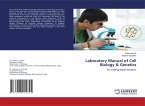Some of the abnormalities associated with chromosome structure and number can be detected by karyotype. A karyotype can show prospective parents whether they have certain abnormalities that could be passed on to their offspring, or it may be used to learn the cause of a child's disability. karyotypes can also reveal the gender of a fetus or test for certain defects through examination of cells from uterine fluid - a procedure called amniocentesis - or through sampling of placental membranes. Over 400,000 karyotype analyses are performed each year in the U.S. and Canada.To create a karyotype, chromosomes from a cell are stained and photographed. The photograph is enlarged and cut up into individual chromosomes. The homologous pairs are identified and arranged in order by size (with the exception of the sex chromosomes; these appear last). These tests are typically done on a sample of blood, although any body cell could be used. The cell must be undergoing mitosis - preferably in metaphase - so that the chromosomes are replicated, condensed, and visible under a microscope. Karyotyping helps doctors diagnose and treat genetic disorders.
Bitte wählen Sie Ihr Anliegen aus.
Rechnungen
Retourenschein anfordern
Bestellstatus
Storno








